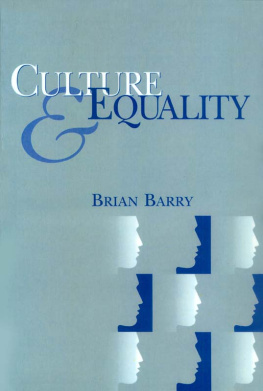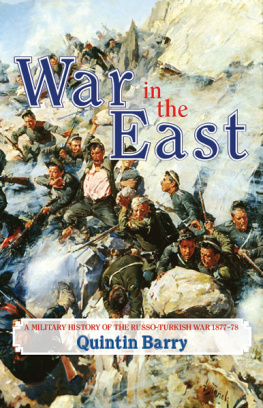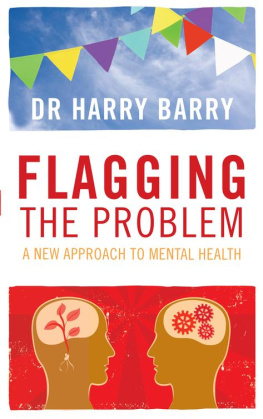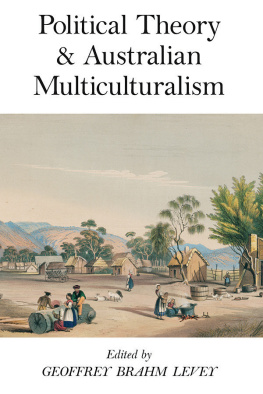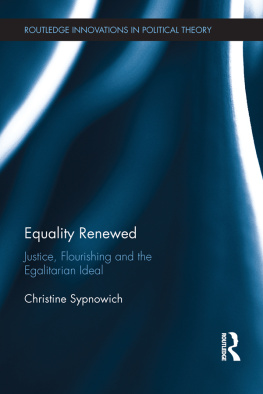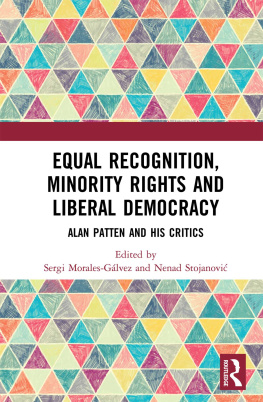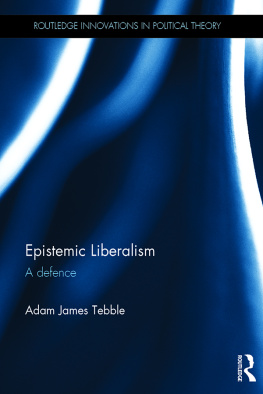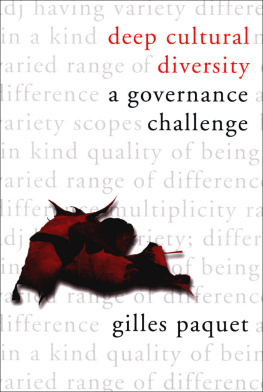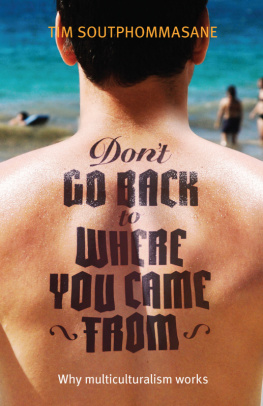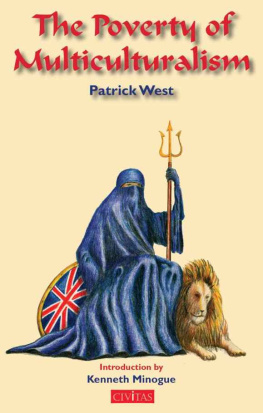Copyright Brian Barry 2001
The right of Brian Barry to be identified as author of this work has been asserted in accordance with the Copyright, Designs and Patents Act 1988.
First published in 2001 by Polity Press in association with Blackwell Publishers, a Blackwell Publishing Company.
Reprinted 2002, 2003, 2005, 2006, 2007, 2008, 2009, 2010, 2011
Polity Press
65 Bridge Street
Cambridge CB2 1UR, UK
All rights reserved. Except for the quotation of short passages for the purposes of criticism and review, no part of this publication may be reproduced, stored in a retrieval system, or transmitted, in any form or by any means, electronic, mechanical, photocopying, recording or otherwise, without the prior permission of the publisher.
Except in the United States of America, this book is sold subject to the condition that it shall not, by way of trade or otherwise, be lent, re-sold, hired out, or otherwise
circulated without the publishers prior consent in any form of binding or cover other than that in which it is published and without a similar condition including this
condition being imposed on the subsequent purchaser.
ISBN 13: 978-0-7456-6564-1 (Multi-user ebook)
A catalogue record for this book is available from the British Library.
Typeset in 10 on 12 pt Times
by Kolam Information Services Pvt. Ltd, Pondicherry
Printed in Great Britain by the MPG Books Group
This book is printed on acid-free paper.
For further information on Polity, visit our website: www.politybooks.com
Preface
This book takes its origins in the many occasions on which Anni and I would linger over the dinner table finishing a bottle of wine (or two) while talking about the latest piece of foolishness, and sometimes bestiality, perpetrated somewhere in the world and defended by somebody in the name of multiculturalism. A form commonly taken by these conversations was imagining even more absurd things that looked as if they could be justified on the same basis. Not infrequently, these flights of fancy later came home to roost, illustrating the point that the reductio ad absurdum is a difficult argument to make against multiculturalism. It was Anni who first said that I should write a book about it, and convinced me that it was worth doing now, rather than later, despite its postponing the completion of my Treatise on Social Justice. Since then, she has continued to discuss the ideas with me as it has proceeded and has come up with additional examples. She has also tried to keep in check the inveterate academic propensity to qualify every statement to death, and sometimes succeeded.
These were all ways in which, according to my understanding of the matter, Harriet Taylor helped to bring John Stuart Mills projects to fruition, so I have taken the liberty of borrowing for this book the dedication that he intended for her. Mills plan was that it would be printed at the beginning of The Principles of Political Economy. In the event, however, it was only pasted in a few gift copies to friends, because of the opposition of Harriet Taylors estranged husband, John.
The technology of authorship has, of course, moved on a lot since Mills day. He would have employed a steel-nibbed pen and an inkpot, whereas writing this book used up several hundred felt-tipped pens. Mill, however, had the advantage of being able to send off his handwritten manuscript to the printer, and was then able to revise what he had written at the proof stage. Nowadays, publishers expect typescripts even disks and do not look with favour on authors who have second thoughts once the book is typeset. The gap between what I produce and what they want has been filled by Anni, who (among other things) deciphered some four hundred pages of fax from the Alto Adige while also superintending our move from London to New York in the summer of 1998, and then set up amid the packing cases to process a couple of rounds of revision after lugging a so-called portable computer across the Atlantic. A fortnight later came the start of the academic year. Between furnishing an apartment, teaching several new courses and working on the book, something would have had to give if Anni had not thrown herself into keeping the show on the road. Unquestionably, what would have had to give would have been working on the book, so it is in every way as much hers as mine.
Anni likes to tell the story about the occasion, about a month after we first met, on which I expounded the crux of the paper given that afternoon to an LSE political philosophy seminar by some visiting speaker. More or less as soon as the words were out of my lips, Anni gave the answer which it had taken about fifteen academics and graduate students twenty laborious minutes to arrive at. I said You know, youre really quite bright. Despite this, we are still together and for that, among all the other things, this book is dedicated to her.
I should also like to thank my history teacher at Tauntons School, Southampton, who suggested, when I said I was wondering about putting in for Philosophy, Politics and Economics rather than History at Oxford, that I should try Language, Truth and Logic and On Liberty and see if I liked them. I liked them both tremendously, but took to On Liberty more, and inside a week had turned in an essay arguing that Mill had got it about right a view that, as will be apparent in this book, I still retain. I am, at any rate, glad to take the opportunity of expressing my gratitude for a piece of advice that has enabled me to get paid, first as a student and then as an academic, to spend the last thirty-five years doing political philosophy.
Like the cat on Shackletons Endurance, Gertie oversaw the entire operation, and made much the same kind of contribution as Mrs Chippy, her speciality being to hide the scissors and stapler (essential tools of the trade if More conventional, but no less sincere, thanks are owed to Elizabeth and Hans Mair and Inge and Iska Brandsttter at the Hotel Sonnenhof in Merano, where several chapters of the book were drafted in July, 1998 and much of the final revision carried out in the summer of 1999. I am particularly grateful to Inge Brandsttter for putting so many pages of draft through the fax machine a job way beyond the call of duty to any ordinary hotelier.
I am also grateful to the organizers of a number of lectures and seminars at which some of the ideas were presented, and to the audiences for their questions and comments. These were as follows: the E. H. Carr Memorial Lecture at University College, Aberystwyth (University of Wales); the Austin and Hempel Lecture at Dalhousie University in Halifax, Nova Scotia; the Annual Meeting of the Conference for the Study of Political Thought, UK (Oxford, January 1998); the IIS Institute at the University of Bremen; the Center for Ethics and Public Policy at Harvard University; the Center for Human Values at Princeton University; the Murphy Center for Political Economy at Tulane University; the Department of Law at Edinburgh University; and the Department of Politics at the University of Newcastle. On the last occasion, Peter Jones and Simon Caney were both kind enough to give me comments in writing, and Peter Jones has also provided me with some valuable comments on the whole draft. In addition, portions of the manuscript have been discussed at various stages along the way by the Rational Choice Group in London and the Washington Square Consensus in New York.

